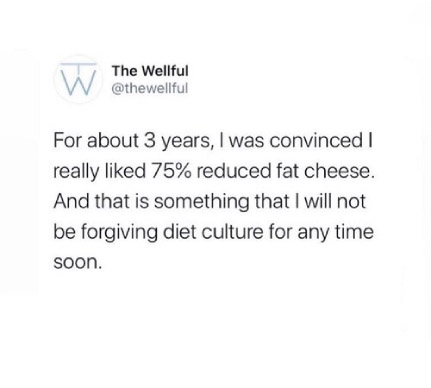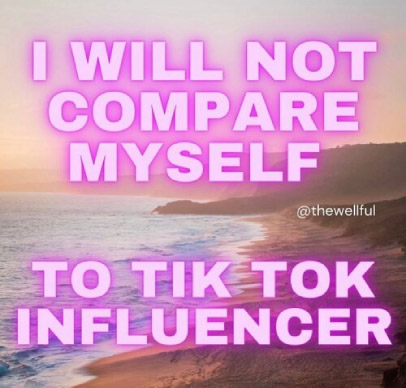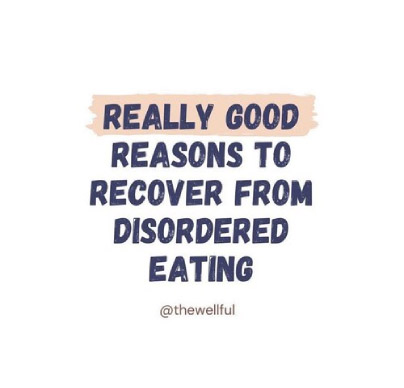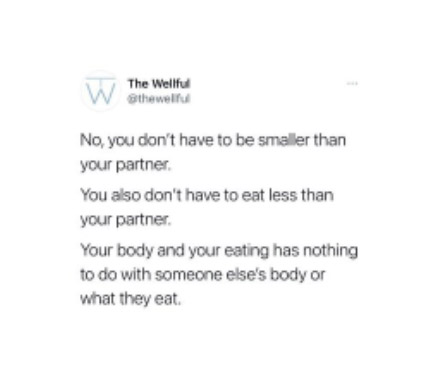Feeling out of control around food is common for people struggling with food and body image issues, but it tends to be especially pertinent at night. As a registered dietitian specializing in eating disorders and disordered eating, I find that many of my clients come to me saying they feel like they just “can’t control themselves around food” at night.
If this sounds like you, the first thing I want you to know is that you are not alone. A lot of people feel this way, and while it’s very common, it doesn’t have to be your “normal.” For those who want to end the binge-restrict cycle and especially those who feel out of control around food at night, I encourage you to ask yourself the following questions. Keep in mind that this is a non-exhaustive list. By working with a registered dietitian like myself, we’ll create a safe, therapeutic space where we can unpack these questions and so many more, all of which will help you understand why you engage in binge-restrict behaviors and how to break free from them. But first, let’s get curious.
Question 1: What did my day of eating look like?
Before the “out of control” feelings of the night start to permeate, think about what your day of eating looked like leading up. Sub questions to ask around this topic include:
- Were there long gaps between my meals and snacks?
- Did I feel satisfied after eating, both mentally and physically?
- Did I eat enough?
Long gaps (like, more than 3-4 hours) in between meals and snacks could perpetuate restriction both physically and mentally. There is such a thing as mental restriction, which involves setting up rules around how much food you allow yourself to eat, when you can eat, and the types of food you let yourself eat. Mental restriction can be detrimental because it mimics feelings of deprivation. At The Wellful, we want you to be mentally and physically nourished. That means living a life free from a restrictive mindset locked in by food rules.
Then there’s the topic of mental and physical satiety. Satiation also plays a role. If you’ve been wanting a specific type of food and/or taste but have been depriving yourself of it because of your self-imposed food rules, chances are your body knows. Your body is likely going to do everything it can to get that feeling one way or another. That often looks like binge eating later on after you’ve spent a period of time restricting the food you actually want. For example, let’s say you’ve had your eye on a bagel and cream cheese but the conversation in your head has been telling you to avoid it and maybe had some ‘alternative’ instead you likely won’t feel that the craving is satisfied. In an attempt to push that feeling away, you may end up eating more other food that you don’t actually enjoy and that doesn’t actually satisfy your craving. This could leave you feeling uncomfortably full yet still unsatisfied! It might have been less mental gymnastisc for both your body and your mind to just have eaten the bagel and cream cheese in the first place.
The last question in this mini section to ask is if you’ve eaten enough. This is rather plain and simple but that doesn’t mean it’s easy. Knowing how much is enough can be tricky when you’re struggling with disordered eating. That’s where I can help.
Question 2: Is there anything else going on that might be impacting my eating?
Food, eating, and how we feel about the two aren’t isolated. They’re part of a bigger picture of how we live and exist in the world. The rest of your life could greatly affect how likely you are to engage in binge-restrict behaviors. Some additional questions to ask here are:
- On a scale of 1-10, how would I rate my stress?
- How have I been sleeping?
- Am I dieting or restricting my eating?
- Is the night time the only “me time” I have during the day?
Your life is made up of so many components, food being a major one of them. Other elements intertwine with food in a way that can make your relationship with eating a bit challenging. The first thing to ask here is how’s your stress? Excessive stress could cause some people to turn to food as a coping mechanism. Some people turn to food while others turn away from it. Both keep the binge-restrict cycle going in a way that tends to be disruptive in the long term.
Another component is sleep. Too little or too much sleep can affect your eating patterns, including your hunger and satiety levels and the times of day you naturally want to eat. Consider this and evaluate whether your sleep is something that needs adjusting.
Active and intentional dieting and restricting is another major contributor to the binge-restrict cycle. Even going on a temporary diet or setting up food rules can kick those mental restrictions we talked about into full force. Pay attention to this and see if you can switch your mindset from one of restriction to abundance. How can you eat in a way that allows more joy, nourishment, and fulfillment into your life? If you’re not sure, working with a registered dietitian to reframe your thoughts around food and eating could help.
Finally, you need to consider your “me time.” We live in a world that celebrates constantly being on-the-go and awards prizes for productivity. That can lead to overexertion and burnout. If the night time is the only time you have to yourself, it could feel like eating is your only outlet to check out. Get curious about this. Can you own that this is your time and instead of feeling bad about eating a snack or vegging out each night, you plan to do so? Are there other relaxing or grounding activities you can add into this time? Are there other opportunities you can build into your day for some more intentional rest? Food is comforting and can be part of self-care and self-soothing. When we notice shame, guilt, pressure or that food is the only coping mechanism we have it can be helpful to check in on this relationship and add in some other supports as well. If so, try to incorporate them into your day and see how that feels. You may find that your nighttime eating becomes less ritualistic and more balanced.
Question 3: Am I trying to “eat clean” or “be good” during the day?
This is a big one I see with clients coming to me struggling with binging and restricting. So often they say, “I don’t get it! I’m so ‘good’ all day but I can’t control myself around food at night!” Ask yourself this:
- Do I allow myself to eat satisfying foods I like during the day? (hint hint: mental restriction plays a major role here)
- Are there different rules for eating alone vs. with other people?
- Do I start my nighttime eating to avoid a craving?
The first question is directly related to mental restriction. The more we try to avoid the foods we actually want to eat, the more we’ll turn to them once finally given the chance (i.e., at night).
The second question, that of rules about eating alone vs. with others, is an interesting one. Some people find social eating to encourage eating differently than they eat alone. There is no ‘better’ or ‘worse’ pattern around this to notice, but it can be helpful to check in on what this looks like for you. Some people feel embarrassed or judged when eating around others so they limit themselves to small portions or only certain types of food. This almost always leads to eating more later on, which is necessary but also perpetuates the binge-restrict cycle. Asking yourself about these varying rules is important. Are you afraid of judgment? Are there other underlying issues? Working with an RD like me can help unpack all of that.
Lastly, the topic of cravings comes up so often around nighttime eating. This goes back to trying to avoid eating a food you really want. Remember, binge eating can happen with any food. Eating a big plate of broccoli may make you feel physically full but not satisfied (because this is not a complete meal). On the flip side, having some chocolate might satisfy a craving but not be physically filling. Finding a balance of foods that are filling and satisfying takes a bit of trial and error but it can also help you feel more attuned to your body and what you need.
Question 4: What do you like about nighttime eating?
This question is important because it asks you to think about why you engage in nighttime eating in the first place. Let’s think about it: we do things for a reason, right? As problematic as the binge-restrict cycle might be, there are parts of it that you engage in because there’s something about it you like. That’s nothing to be ashamed of; it only makes sense. So let’s start here: what do you like about nighttime eating?
- Does it feel satisfying or exciting?
- Is it your only time to unwind/spend time with yourself?
- Is it comforting?
- Is there something else you like about it?
This isn’t the place for judgment. Rather, I just want you to take inventory of your mental and emotional state and needs.
Question 5: What don’t you like about nighttime eating?
You may have guessed it, but the previous question was a direct lead-in to this one. If you want to change something that’s causing you distress but you’re having a hard time doing it, you need to ask yourself why you’re doing it in the first place. Then you need to ask yourself why you want to stop.
- Does nighttime eating come with guilt or shame?
- Does it sometimes feel uncomfortable?
- Does it feel out of control or out of body?
- Does it stir up thoughts of restriction or old eating disorder habits?
All of these are valid concerns and perfectly good reasons to want to break the binge-restrict cycle. But if the things you dislike about nighttime eating and the binge-restrict pattern don’t fall into this list, that’s also perfectly okay! You deserve to feel better and The Wellful wants to help you get there. Your relationship with food is individual so while I hope this post offers you a starting place to explore your relationship with food, we often need additional support as well.
Built on a foundation of nutrition science, compassionate and therapeutic support, free from diet culture, The Wellful is a place where you can find a sustainable and positive relationship with your body. To get started, I encourage you to schedule a free 15-minute consultation with Brenna, RD.











